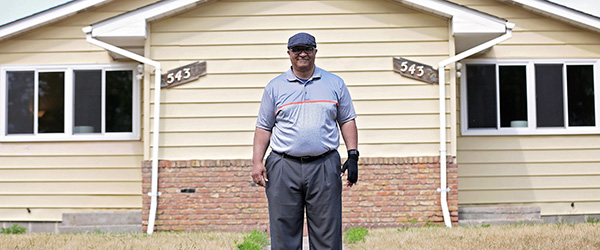New transitional home helps men find a ‘Pathway Forward’
The Salvation Army has opened a new men’s housing facility that bridges the gap between halfway houses and independent living.
The facility, called the “Pathway Forward” house, is a remodeled five-bedroom duplex in the northern Twin Cities suburbs, with an office and onsite case manager. The home provides men more freedom and independence than what is offered at traditional halfway houses, while still providing the support services they need to live a sober and productive lifestyle.
Without supportive housing programs like this, it can be easy for men to fall back into trouble.
“Oftentimes, men coming out of prison or halfway houses can’t find a place to live because rent is too expensive or landlords won’t rent to them,” said Charles Berry (pictured below), Prison Ministries Director for The Salvation Army Northern Division. “This home knocks down those barriers and gives men a pathway forward.”

Residents pay a monthly service fee and can stay up to two years, while receiving case management services to help with things like budgeting, job training, finding employment, and spiritual support.
“Spiritual support is one of the most important components to this program,” Berry said. “We want to show these men Christ’s love.”
Two of the facility’s residents, Tom and Roderick, are thrilled about living in the home and the second chance it has afforded them.
Tom
Tom is a 29-year-old recovering alcoholic trying to get his life back on track. He entered treatment at The Salvation Army Rehabilitation Center in Minneapolis in December, graduated in June, and now works in maintenance.
Tom’s main goals are to stay sober, reduce his debt, catch up on paying child support for his 4-year-old son, and be financially secure enough to live on his own. Living at the Pathway Forward home will help him accomplish these goals.

“I like that there is a case manager here all the time,” Tom said. “That’s a worry at some halfway houses; if you don’t have a case manager onsite, you can run into problems.”
Tom also wants to be a better father to his son, who lives with his mom in Wisconsin. Tom knows that reestablishing a relationship with his son will require patience and sustained sobriety.
“I’d rather be five hours from my son and sober than live five minutes away from him and be drunk,” Tom said. “That’s a sacrifice I’m willing to make for now so that when I can spend time with him again, I’m present and being a good father.”
Tom is optimistic about his future, thanks in large part to the support he is receiving at the Pathway Forward home.
“I’m thankful for this place,” Tom said. “My mantra is: Another day sober is another step in the right direction.”
Roderick
Roderick is a 49-year-old man recovering from a 20-year addiction to crack cocaine.
Roderick spent most of his life in Pittsburgh, Pa., where he worked as a janitor, cook, security guard, and other jobs.
“I have always worked,” he said. “I wasn’t the kind of addict who could be homeless and survive on the streets. I’m not built like that.”
Roderick has been through treatment before. He’s always had trouble staying sober, he said, because he was never been accountable to anyone.
“That’s what I like about this place – I’m held accountable,” Roderick said. “That’s the one thing I haven’t had before. I’d always tell myself, ‘I got this.’ But I didn’t have it. Now I understand that you can’t do it alone.”

Roderick now has a job as a security guard. By living at the Pathway Forward home, he can save money, build his employment history, receive personalized support, and work toward becoming the man he has always wanted to be.
“I don’t want to use drugs again,” Roderick said. “I’m going to take the steps that God has placed on my heart. The Salvation Army and this house are a blessing. Whenever I’ve been at my lowest, The Salvation Army has always been there for me.”
Please join The Salvation Army by giving a donation or signing up to volunteer. Your help will provide food, shelter and care for people and families in desperate need.
